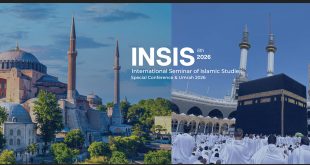The thematic issue of Dominican Institute for Oriental Studies is devoted: the Islamic theology of catastrophes at different periods of history, in ancient, modern and contemporary theological thought, Called for Papers for MIDEO 38 (2023).
The Covid-19 pandemic broke out around October-November 2019 in China. In addition to having become a global public health problem, it quickly became “a total social fact” (Mauss, 2013). It has effectively set in motion a plurality of institutions and social fields (economic, political, cultural and religious), within both national and international milieus.
The epidemic (wabāʾ) has thus generated its share of comments and religious glosses by prominent religious figures. For example, the Moroccan theologian Aḥmad al-Raysūnī, president of the International Union of Muslim Scholars (IUMS), stated with regard to the Covid-19 pandemic (ǧāʾiḥat kūrūnā), that it belongs to “the tradition of trial/affliction” (sunnat al-ibtilāʾ), so that both “believer and reasonable men” will further question how to “benefit” from this “trial” (yastafīdu min al-balāʾ), or “lessons” (al-ʿibar wa-l-durūs), from a spiritual and existential point of view so that, in the end, according to him, people can meditate on “their way of life and behaviour” (uslūb ḥayātihim wa-sulūkihim).
The research of Jacqueline Sublet, Josef van Ess, Boaz Shoshan, Lawrence I. Conrad and Justin K. Stearns, among others, show that beliefs about the epidemic were largely determined by theological discourses until the 19ᵗʰ century. Nevertheless, while this research is still scholarly relevant and useful, it lacks in part a closer analysis of the content of the traditions. Also, in view of the acuteness of this Islamic theology of catastrophes that has (re)deployed itself recently, especially in the predominantly Muslim world, some questions on continuities and discontinuities in the theological discourse remain to be questioned and further investigated. This includes questions relating to the norms and the ethical dilemmas that arise for practicing Muslims and their religious authorities: ethical dilemmas between destiny and human action, and in particular the responsibility before God and the whole of humanity; between the preservation of human life and the imperatives of observance of religious rites and rituals in the strict sense. Who caused the epidemic: God, the jinns or men (and which ones)? Should theologians interested in the question rely on science or revelation to explain epidemics and natural phenomena, but also to overcome, prevent or ward off disasters? What is the share of the sacred and of the secular or the profane in Islamic theologies? To what extent is the Islamic theology (or Islamic theologies) of disasters also and simultaneously a theology of fear, if not of responsibility/culpability of human beings towards themselves and towards humanity? What difference does classical and contemporary Islamic discourse make between Muslims and non-Muslims in the face of the epidemic? How can we understand the different religious normative arguments used by the theologians? In this regard, are there any differences between Sunni and Šīʿī literatures? Or between ancient and late literature on disasters or on human dramas? How do contemporary Muslim theologians seize upon classical religious literature to develop their view of the environment, the unleashing of natural elements, or even rebellion against the political order, etc.?
It is to these major questions, among other possible ones, that this thematic issue of MIDEO is devoted: the Islamic theology of catastrophes at different periods of history, in ancient, modern and contemporary theological thought.
Important Data
Abstract Submission Deadline: June 30, 2021 (the publication is scheduled for January 2023).
Please send your proposed article to: mideo@ideo-cairo.org
MIDEO welcomes articles and scientific text editions. We do not set a maximum length for articles, as long as the scientific interest is there.
 Ijtihad Network Being Wise and Faithful Muslim in the Contemporary World
Ijtihad Network Being Wise and Faithful Muslim in the Contemporary World
